News
Hajj 2024: First Batch Of Nigerian Pilgrims Return On Saturday

By Kayode Sanni-Arewa
A Saudi-designated Nigerian air carrier, Flynas says it will transport the first batch of Nigerian pilgrims back home on Saturday.
The Managing Director, First Planet Travels and General Sales Agent (GSA) of Flynas, Alhaji Umar Kaila, disclosed this in a statement on Friday in Makkah, Saudi Arabia.
The statement said the maiden return flight would begin on Saturday by transporting pilgrims from Kebbi state from King AbdulAziz International Airport in Jeddah to Sir Ahmadu Bello International Airport (SABIA) in Birnin Kebbi, Kebbi State.
It could be recalled that Flynas performed the inaugural hajj flight from Birnin Kebbi, Kebbi State on May 16. The airline transported its 19,908 allocated pilgrims to Madinah in 48 flights.
According to the statement, Mr Kaila said, “We are happy to announce that Flynas is fully set to begin the Phase Two of the airlift operation of Nigerian pilgrims from Saudi Arabia to Nigeria from Saturday, June 22, 2024, with pilgrims from Kebbi State.
“Like we had a seamless airlift operation from Nigeria to Saudi Arabia during Phase One without any delay, we have made adequate arrangements to transport back our pilgrims back to Nigeria in a seamless and efficient manner.”
He said the airline has perfected arrangements to ensure a smooth and seamless return airlift operation from Saudi Arabia to Nigeria.
Flynas would transport pilgrims from Kebbi, Lagos, Sokoto, Zamfara, Yobe, Borno, Osun, Ogun, and Niger states back to Nigeria in the second leg of the operation.
The Flynas managing director said the airline would conduct the return operation in 49 flights with five aircraft.
The statement also quoted the Makkah Coordinator of the airline, Malam Ahmad Ruma, saying that the ground staff of Flynas have started processing Kebbi state pilgrims in their accommodations in the holy city of Makkah Makkah.
“Our staff have already processed the Kebbi state pilgrims for the first return flight. They met them in their accommodations in Makkah, manifested them in the aircraft, weighed and tagged their 32-kg luggage, among others,” Mr Ruma said.
The Makkah coordinator said the airline has also started processing pilgrims from Lagos state for the return journey.
Flynas is one of the three airlines engaged by the National Hajj Commission of Nigeria (NAHCON) to transport over 50,000 state pilgrims to Saudi Arabia for 2024 hajj pilgrimage.
The two others are Max Air and Air Peace.
News
Kwara govt revokes signage, billboard licenses

The Kwara State Government has announced the immediate revocation of all signage and billboard licences issued in 2024 with enforcement actions set to begin next week.
The government also warned that identification and removal of unauthorised billboards would commence shortly.
The announcement was made in a statement released on Sunday by the Chairman of the Kwara State Task Force Committee on Illegal Billboards and Signages, Bolanle Olukoju.
Olukoju, who is also Commissioner for Communications, explained that the revocation was in line with a previous notification suspending all billboard licences in the state.
He said the move aimed to facilitate the removal of unauthorised and improperly erected billboards, posters, and light pole banners throughout Ilorin and other urban centers.
“This initiative aligns with the Urban Renewal Programme of the Governor AbdulRahman AbdulRazaq-led administration, which seeks to transform Kwara into a modern and visually appealing state,” he said.
The government also confirmed that no new registrations or renewals of signage and billboard licences would be processed until further notice.
The temporary measure, the statement added, will allow the state to finalise a new regulatory framework for outdoor advertising.
The statement further emphasised that identification of non-compliant billboards is already underway, and owners of unregistered billboards are urged to remove them immediately.
News
FG outlines requirements for civil servants wishing to change their name, next of kin

The Federal Government has unveiled requirements for civil servants seeking to migrate their salaries, change their names and their next-of-kin among others.
This was revealed in a memo by the Office of the Head of Civil Service of the Federation dated March 12,2025 and addressed to all Federal Government Ministries, Departments and Agencies.
The memo said the government had observed that civil servants effecting the changes on their names and next-of-kins do not submit the necessary documents needed to effect such changes, hence the need for the memo.
“Further to the Circular Ref. HCSF/PS/CMO/IPPIS/I/VOL.I/508 dated 1st November, 2022 on the above subject, the Office of the Head of the Civil Service of the Federation has observed that some Ministries, Departments and Agencies do not attach the required documents which would facilitate granting approvals for migration of saiary, change/correction of names, gender and next-of-kin within the shortest possible time.
“MDAs should therefore, note and be guided by the following Standard Operating Procedures for requests on changes/corrections on HR records of employees on the IPPIS Platform:
With the implementation of the Human Resource component of the IPPIS in the Federal Public Service, it has become necessary to take note and be guided by the above requirements.
“Kindly note that requests that are forwarded to the Office of the Head of the Civil service of the Federation without specific documents will not be processed for approval. Please bring the content of this Circular to all concerned for strict compliance,” the memo read.
News
Atiku supports Lagos corps member facing threats due to viral video

Ex-Vice President Atiku Abubakar has expressed support for a Lagos-based National Youth Service Corps member, Ushie Uguamaye, also known as Raye, who claimed to have received threats after her viral video criticising President Bola Tinubu’s administration.
In a statement shared on X on Sunday, Atiku praised Raye’s courage, describing her as a symbol of a new generation of politically engaged women committed to advocacy and democratic participation.
“Raye embodies the spirit of a new generation of women who champion the ideals of popular participation and unwavering advocacy in the political sphere.
“I deeply admire her boldness and wisdom—her fearless resolve to speak truth to power, undeterred by the weight of opposition,” Atiku wrote.
The former presidential candidate likened Raye to historic female activists such as Gambo Sawaba, Funmilayo Ransom-Kuti, and Margaret Ekpo, who played pivotal roles in Nigeria’s political landscape.
Atiku called for support rather than hostility towards Raye.
“Rather than being met with hostility, Raye deserves encouragement and support. She is a shining emblem of the Nigerian youth—a testament to the long-held promise that the leaders of tomorrow are already among us, ready to shape a better future,” Atiku said.
Raye, a corps member serving in Lagos, recently made headlines after a video she posted criticising government policies went viral.
She later claimed to have faced threats, reportedly from NYSC officials, pressuring her to take down the video.
In the video posted on her TikTok account #talktoraye on Saturday, Raye voiced frustration over Nigeria’s deteriorating economic situation, lamenting that hard work no longer guarantees financial stability.
She criticised Tinubu’s leadership, calling him a “terrible leader,” and questioned the government’s commitment to easing citizens’ hardships.
Authorities have yet to comment on her allegations.
-

 News18 hours ago
News18 hours agoNDLEA busts DTOs desperate bids to move hard drugs to US, Saudi Arabia, Poland(Photos)
-

 News15 hours ago
News15 hours agoWhy FG Must Stop Harasing Nigerians For Criticising Govt – Amnesty Int’l
-

 News11 hours ago
News11 hours agoGovt is planning to arrest me– Natasha Akpoti-Uduaghan alleges
-

 News15 hours ago
News15 hours agoNSITF wants promotion of consistent safety culture at workplace
-

 News13 hours ago
News13 hours agoNYSC member may undergo 30-day service extension for slamming Tinubu
-

 News15 hours ago
News15 hours agoTravel guide: Lagos To Seal Independence, Marina-CMS Bridge For Two Months
-

 News18 hours ago
News18 hours agoFuel Crisis Hits Niger Republic As Military Junta Begs Nigeria For Supplies
-

 News18 hours ago
News18 hours agoGOOD NEWS! Nigeria Police Set To Give Personnel Loan To buy keke






